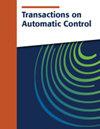规定时间分布式优化的多阶段/单阶段滑动流形方法
IF 7
1区 计算机科学
Q1 AUTOMATION & CONTROL SYSTEMS
引用次数: 0
摘要
规定时间收敛机制在优化和控制领域引起了极大的关注,主要归因于其精确操纵目标完成时间的能力。本文构造了具有规定时间稳定性的滑动流形,并在此基础上建立了两种改进的零梯度和算法。一种优化算法是基于多级结构框架,另一种是基于单级结构框架。与规定时间分布式优化中必须定制多阶段结构不同,本研究弥补了单阶段结构化规定时间ZGS算法的不足。与现有的多阶段算法不同,本文提出的优化算法在较温和的条件下能在规定的时间内收敛到最优解。此外,还首次提出了一种基于时变尺度函数的无奇点规定时间分布式优化算法。此外,还分析了无奇异算法在抑制外部干扰方面的鲁棒性。通过一个交会编队问题的仿真,验证了该方法的无奇异性和增强的鲁棒性。本文章由计算机程序翻译,如有差异,请以英文原文为准。
Multi/Single-Stage Sliding Manifold Approaches for Prescribed-Time Distributed Optimization
The prescribed-time convergence mechanism has garnered significant attention within the fields of optimization and control, primarily attributed to its ability for precise manipulation of target completion times. This article formulates sliding manifolds with prescribed-time stability, based on which two modified zero-gradient-sum (ZGS) algorithms are established. One of the optimization algorithms is developed based on a multistage structural framework and another is based on a single-stage one. Contrary to the necessary customization of multistage structures in the prescribed-time distributed optimization, this study bridges the gap on the single-stage structured prescribed-time ZGS algorithm. Different from the existing multistage algorithms, the proposed optimization algorithms are proven to converge to the optimal solution within a prescribed-time under more mild conditions. Besides, for the first time, a singularity-free prescribed-time distributed optimization algorithm based on time-varying scaling function is proposed. Furthermore, the robustness of the singularity-free algorithm in rejecting external disturbances is also analyzed. The simulation involving a rendezvous formation problem is elaborated to demonstrate the singularity-free prescribed-time convergence and enhanced robustness of the proposed approaches.
求助全文
通过发布文献求助,成功后即可免费获取论文全文。
去求助
来源期刊

IEEE Transactions on Automatic Control
工程技术-工程:电子与电气
CiteScore
11.30
自引率
5.90%
发文量
824
审稿时长
9 months
期刊介绍:
In the IEEE Transactions on Automatic Control, the IEEE Control Systems Society publishes high-quality papers on the theory, design, and applications of control engineering. Two types of contributions are regularly considered:
1) Papers: Presentation of significant research, development, or application of control concepts.
2) Technical Notes and Correspondence: Brief technical notes, comments on published areas or established control topics, corrections to papers and notes published in the Transactions.
In addition, special papers (tutorials, surveys, and perspectives on the theory and applications of control systems topics) are solicited.
 求助内容:
求助内容: 应助结果提醒方式:
应助结果提醒方式:


